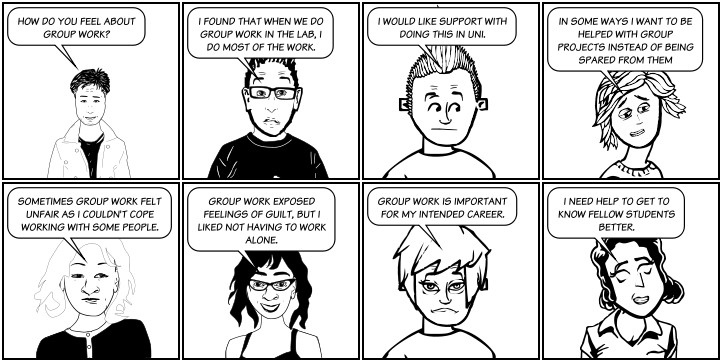There are some skills that you can’t learn from books, but which can be useful in professional life. Here’s how to take advantage of university to put them into practice.
Context
During university studies, group work is required in many courses. Group work can be complicated to manage, but it allows the development of so-called transferable skills: they are not directly necessary in the branch studied, but they can be important for professional life that will follow your studies. Examples of transferable skills are:
- Cognitive skills:
Working in a team, showing analytical and conceptual skills, collaborating with people from different backgrounds - Interpersonal skills:
clarifying verbal communication, taking turns speaking, listening to and considering the opinions of others, developing an argument, understanding opinions that differ from your own and negotiating decisions - Execution skills:
have a sense of order, rigour, and quality, manage time constraints by planning and organizing, be autonomous and proactive in your work, - Influencing skills:
Taking responsibility, sharing knowledge, exercising leadership to bring a project to fruition, sharing an organization type - Personal skills:
keeping commitments, resisting stress, showing flexibility, creativity, and willingness to learn, developing self-confidence.
Some people love working in groups, while others find it difficult. Some people are sensitive to the fairness of the work done, while others are less concerned about it.

There is no perfect way to form groups, so this task is also difficult for teachers to organise. Indeed, if groups are formed randomly (or by characteristics such as family names) they may be made up of people with different skills and result in a heavier workload for the strongest student than for the weakest. If students choose their own groups, they are among friends, which is nice but not necessarily conducive to performance or socialising with new people. This also makes it difficult for less popular students to find a group.
What does that have to do with me?
If you have had bad experiences in the past during group work, it is understandable to be worried. At university, students are adults and perhaps a little more tolerant than at compulsory school.
Everyone has preferred roles in a group. Some people are natural leaders who are good at getting things done. Some people are very creative and excel at generating innovative ideas. Some are excellent at administration, making sure appointments are set and protocol is followed. Some are good at bringing the group together and making everyone feel part of a team. Some people make fabulous slides, others are good at literature searches or public speaking. Most people have a mix of talents and preferences, as well as areas that are still evolving.
Knowing what you are good at and being able to say it without being arrogant allows you to use your strengths in a team. Likewise, knowing where you have more difficulty allows you to avoid roles where these are the main characteristics.
“Presenting work in public was really painful at first, but gradually it became easier.” (L., Finnish student)
Learn, work and review with your peers
In addition to classes where teachers explicitly ask you to form groups, many students create a group chat for the whole class (often on WhatsApp or similar platforms) to exchange and ask each other questions when in doubt, away from the teachers’ eyes.
This medium facilitates contact and interaction because it avoids certain misunderstandings related to the social context and direct verbal interaction. It requires a certain amount of vigilance because all types of information are exchanged, important or not, right or wrong.
A good way to connect with other students is to offer exchanges for mutual review of work. Giving feedback to a colleague is a good way to learn to stay on top of constructively communicated facts.
What is the next step?
Think about your strengths and challenges for group work
Practical advice
- Listen to the ideas and opinions of other students
- Explore new ideas that you find interesting
- If you think it would be helpful, talk to your colleagues about your autism so that they understand how it affects you
- Make a list with two columns: in the left-hand column, write down all the things that worry you about the group work. In the right-hand column, write down how you would solve these problems
- Take time to talk about this list with someone you trust
- If you find it difficult to communicate with your fellow students, perhaps getting in touch via the WhatsApp chat of your study programme would be easier
- When you are integrated in the chat, do not overload the chat with too many messages
- If you have a request to make, it may be helpful to think about what you can offer in return
- When giving feedback to someone else, stick to the facts so as not to offend the other person
- Take advantage of group work as it gives you a chance to deepen your transferable skills
- If your group members give ideas that you think are bad, question them first to understand their ideas, and then give your idea
- Set ground rules for group work and communication, e.g., frequency of meetings, type of feedback, means of communication, deadlines etc.
- Distinguish the objectives: group meetings, even if they are not always productive, allow you to get to know your colleagues better
- Don’t hesitate to agree to be part of a study group, even if you don’t know anyone
You will find in the chapter Transition to working life some useful tips to make all your transferable skills visible
Questions to ask yourself
- Would I like to tell the group that I am on the spctrum and how it affects me?
- Have we established working and communication rules for our group?
- Could I become friends with the members of my group?
- Do I know what the role each person in the group is?
- What is my role in a group?
- How will I divide the work fairly?
- What are my strategies if I encounter the following problems with group work?:
- For example, what if someone doesn’t come to the meetings?
- For example, if some members of the group are having fun and getting in the way of doing the work?
- For example, what if some of them don’t get involved or have difficulty?
- For example, if a person does not speak English very well?
- How do I get organised when there is a deadline to meet?
- What are my strategies in case of disagreement?
Additional information
About the author
Edited by: Nathalie Quartenoud ©
Translated by: Daniel Dukes


 Back
Back